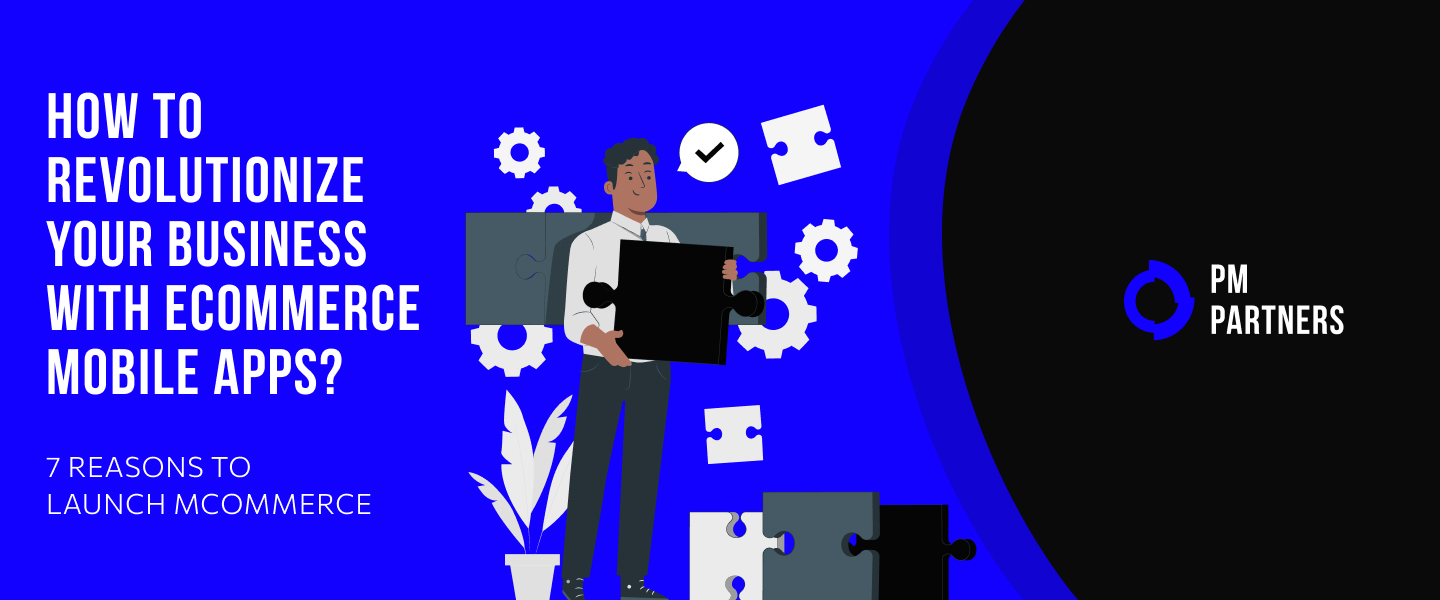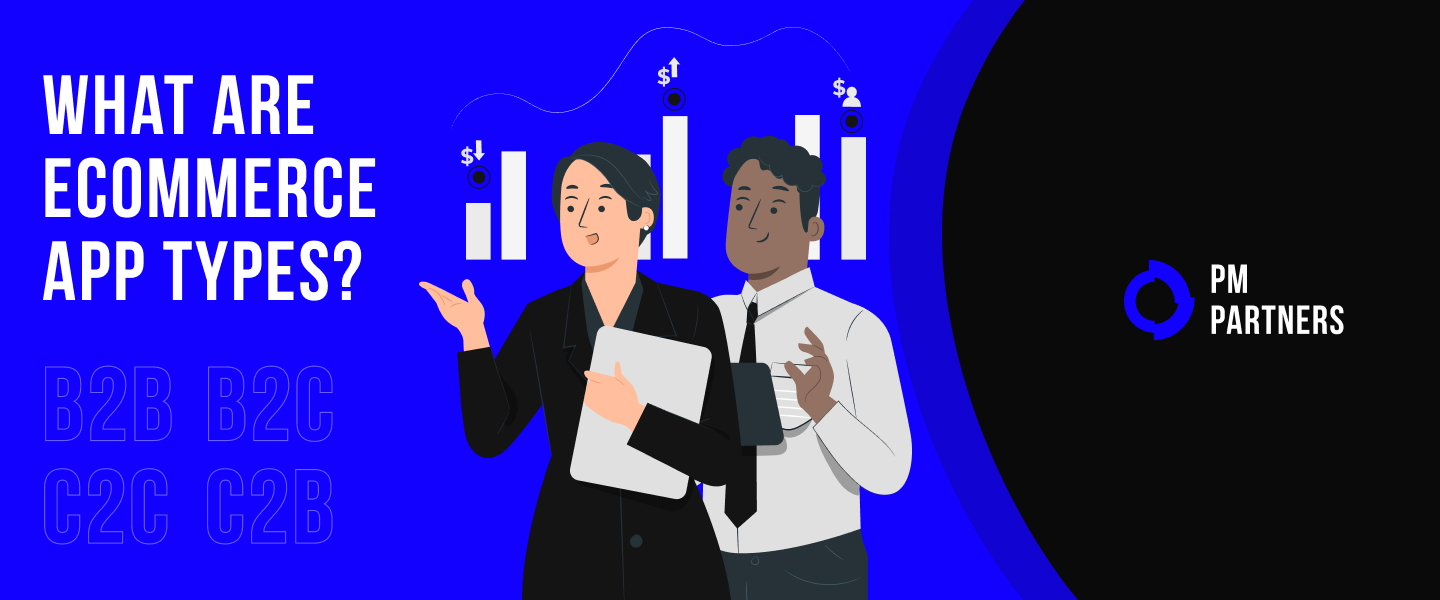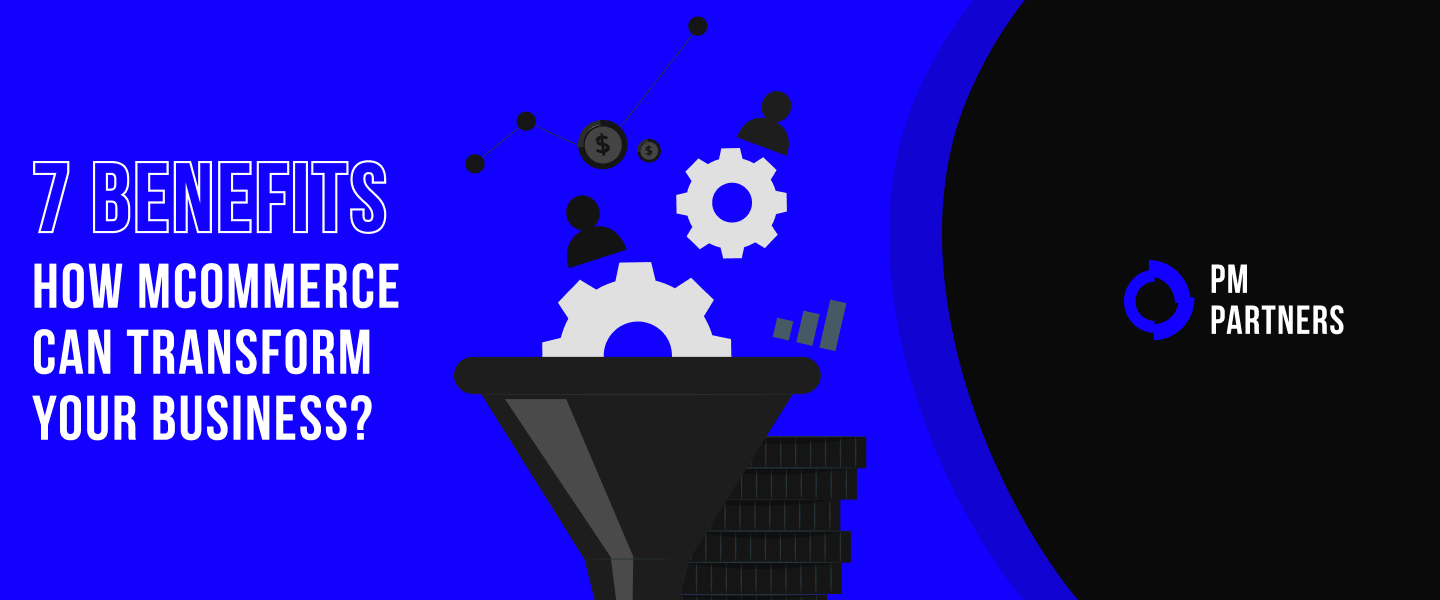AND COMPANY UPDATES
Talking about blockchain, web and
software development with expert knowledge.
Talking about blockchain, web and
software development with expert knowledge.
 All articles
All articles

In the present day, probably any vendor or products and services in the eCommerce niche have to deal with a large number of customer requests. It doesn’t come as a surprise, considering that the revenue from this niche increase by approximately 10% on an annual basis. It means that the number of customers and their spending rise gradually.
At the same time, eCommerce is a highly competitive industry. Regardless of whether you are a supplier or a marketplace owner, the number of companies that are offering similar goods and products in your niche is vast.
So, there’s a simple answer to the question “how mobile apps can be used for eCommerce” — they help to keep up with the tempo and deliver a better customer experience. Needless to say, probably any business in the industry needs a sufficient digital solution.

ECommerce apps are digital software solutions centered on the eCommerce industry as a marketing medium. Mobile apps for e-Commerce are typically multipurpose. They may be represented with the following models:
All the apps that focus on providing goods and services between businesses fall into the B2B category. Products sold often become the raw material or manufacturing or marketing tool for another company. Sometimes, B2B apps serve as an intermediary between a wholesale supplier or retailer and a smaller retailer.
These are vivid examples of eCommerce apps. B2C software solutions connect businesses with end consumers of their goods, products, or services.
In this case, an app only facilitates the exchange between consumers. Auction apps fall within this category.
This is rather a rare instance of an eCommerce app. Designers, writers, and similar experts may offer their services and products to agencies, which, in their turn, transfer the value in the form of a business offering to end consumers or other businesses.
Mobile apps for e-Commerce or mCommerce apps combine more than one functionality. Let’s review several instances of what processes and business models these tools may serve:
E-retailing is probably the most rapidly growing niche within the eCommerce industry. It refers to the transaction of products via the net of online stores. E-catalogs and online shopping carts comprise the main functionality of such apps. There may also be additional features such as personalized suggestions, discount offers, and more.
Such software solutions usually work as per the B2C model. Mobile-baed tools help store managers to proceed with orders, while customers enjoy the simplified sales funnel, the speed of communication and order implementation, and superior user experience.
These days, the finance and eCommerce industries are well-connected. Stock markets and providers of banking survivors utilize means of eCommerce extensively to offer their products and services. For example, online banking is a convenient tool that offers users a simplified finance management process. From balance checks to bill payments and money transfers, every service line backed by digital banking easily falls within the much wider definition of eCommerce.
Finance mobile apps usually operate as per the B2C model, but B2B finance platforms and mobile applications are not unheard of. They may be used, for example, for financial management and accounting.
ECommerce software solutions often serve as intermediaries between raw materials suppliers and manufacturers of goods. Buying and selling operations between businesses are handled through such applications. They may allow for the exchange of documentation and the signing of contracts. Some manufacturing and supply chain apps are blockchain-based, giving companies the opportunity to use smart contracts to ensure better security of financial operations.
Not to mention that eCommerce apps offer business additional capabilities such as sharing market status, inventory checking, cargo location monitoring, and many more. At the end of the day, the B2B model is not that different from B2C.
This is a rather unusual type of eCommerce application. They are in vogue for comparatively inexpensive items online auctioning. Mobile software offers users to explore events without any boundary limitations. Once again, the app is a medium between parties, which are, in this case, customers that provide lots and customers that bet on lots.
Such mobile apps typically operate under the C2C model, but from a certain perspective, the owner of the digital solution provides their services as per the B2C model.
ECommerce is associated mainly with building brand image and solid relationships with customers. From this perspective, mobile apps may serve as platforms for brand promoting, discount offering, product showcasing, and more. Just having means of brand-customer communication and the feedback channel is already an excellent opportunity that shouldn’t be overlooked.
Marketing mobile apps are less widespread since all of their functionalities can be integrated into a retail and wholesale solution. Marketing software operates under the B2C or B2B model, depending on who the consumer of services or products is.
Travel and tourism-centered eCommerce apps have online booking as a stand-alone functionality. Hotels, resort areas, or transportation businesses are regarded as one party, and end customers are regarded as a second party. Online booking e-commerce applications allow people to get the essential flight, stay, and other services with ease.
Once again, such types of digital software operate as per the hybrid C2C with B2C model. In some cases, online booking functionality may be integrated into a large eCommerce app or be a distinct feature of any conventional B2C software.
Magazines and e-books continue replacing conventional, paper-based ones. This tendency greatly adds to the popularity of online publishing platforms. They receive for free or purchase pieces of content from independent writers, news agencies, literary agencies, and similar businesses.
Online publishing mobile apps operate as per the hybrid concept, showing elements of B2C, B2B, C2C, and C2B models.
Contact PM Partners and schedule an eCommerce dev consultation with our business analysts and other experts.
Let’s take a look at features that the best eCommerce apps should have.
If an app is supposed to contain a catalog of products, you definitely need to add some search and navigation functionalities. Having all goods and services properly categorized will only improve user experience.
Probably any profit-oriented business has this feature in their retailing app. Shopping carts allow to manage orders better, form wish lists, and simplify marketplace use.
Even if the entire app is extensively-tested and all the customer interactions are well-tuned, you still should leave the opportunity to contact your support team on any matter. Just in case.
If you want customers to use your app more often, you should offer some personalization. Possible adjustments may include colors of text blocks, push notification settings, location switches, interface languages, and more. A stand-alone feature is personalized suggestions. These are smart recommendations that the AI generates based on a customer’s interactions with the marketplace items. Offering alternative products heavily increases the likelihood of a customer purchasing specifically from you.
It’s known that customers tend to drop apps and even uncompleted orders. Sometimes, a timely reminder is all that’s needed to resume communication and brand-customer interaction. Not to mention that some customers prefer to know about discount offers, new product lines launched, and all things like this.
E-banking and blockchain technology granted the world a range of payment opportunities available. Adding several payment gateways is what minimizes the risks of losing customers that simply couldn’t make a purchase the desired way. Don’t forget to add integration with Google Pay and the feature for automatic inputting of credit card data. It will simplify payment completion for customers and eliminate potential transaction errors.

Now, let’s review some of the benefits of integrating mobile apps for e-commerce to your business environment.
ECommerce is not only about product distribution. Frequently, businesses miss promising options, such as marketing their products, collaborating with other businesses, offering value-added services, and more.
Having communication channels with consumers or goods and products is due. By gathering feedback, the business ensures the constant improvements of their goods, gathers usable info for the target audience, delivers better customer support, etc.
It’s frequently that a customer doesn’t even know that they need a product or a service before they spot a business. It can happen through seeing a brand account on social media or noticing a business application in a mobile marketplace.
ECommerce mobile apps are all about engaging customers and helping them to buy from a business more. Having a mobile-based software solution equal having one more way in which you may generate leads and turn them into sales.
Two-thirds of online shoppers like accessing marketplaces via mobile phones. Having a web platform is obligatory, but so it is a mobile app that would deliver a better mobile platform experience.
These days, users highly value the range of options that a business offers to them. If a company doesn’t have a brand mobile app, it’s already regarded as a restriction. On the opposite, mobile solutions enhance customer retention rates.
By offering more convenient ways to access your products and services, you save customers’ time. At the same time, by offering advanced marketplace and brand communication opportunities, you save the working hours of your managers and admins,
Contact PM Partners with rough requirements for your eCommerce software, and we will get back to you shortly with the free quote.
We provide time estimations based on technical requirements. We always stick to deadlines negotiated and get the project finished by the due date.
Yes, we offer constant communication with our management team and technical specialists, if necessary, so you have full control over the undergoing processes.
We provide price estimations based on technical requirements. We offer different partnership models and never impose any hidden charges on you.
Choose PM Partners as Your Trusted eCommerce App Developer

The development of an eCommerce platform for mobile apps is what you need a reliable vendor for. This niche is fast-passing and highly sensitive to the experience of developers.
PM Partners team is a well-seasoned provider of mobile apps for eCommerce sites. We offer end-to-end development, including anything from the market discovery phase to the deployment of the ready-to-use solution and their technical support and maintenance. Our team includes business analysts, designers, developers, project managers, and other IT experts that may take on an eCommerce project of any complexity.
Here at PM Partners, we are proud of our extensive portfolio of successfully completed cases. We worked on several eCommerce web platforms and mobile applications, track and trace systems, blockchain mobile solutions, and more.
Here are some benefits you reap by requesting our services:
Drop us a line, share your project details, request a free strategy session, and get a market-leading dev team for your project.